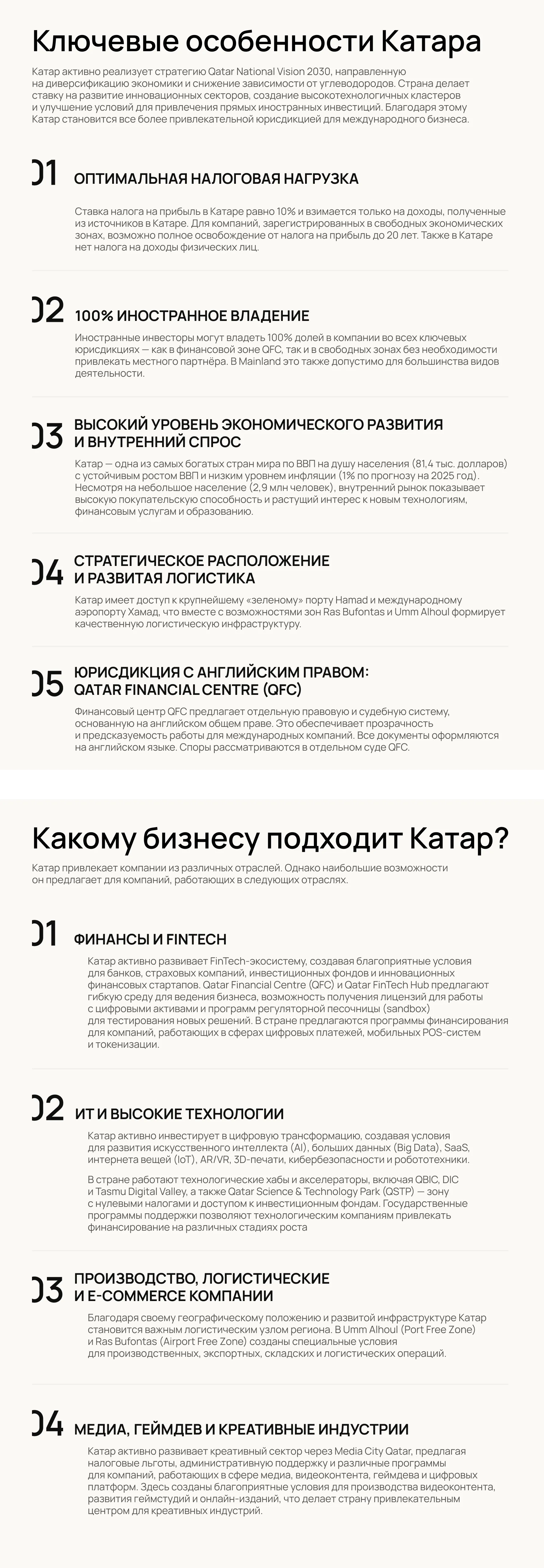Business
Qatar: What you need to know about the country
Qatar combines a conservative legal system with progressive economic reforms.
Contact us

Overview
Low taxes, the absence of VAT, and developed infrastructure make it attractive for business. However, competition with the UAE and Saudi Arabia requires a clear strategy. Successful projects often focus on energy, digitalization, and events.
Sources of Law
- Sharia Islamic banking is a prominent example of Sharia principles in the financial sector. It follows rules that prohibit riba (interest-based lending), promote fair risk-sharing, and ensure ethical compliance
- International Treaties As long as they do not contradict Sharia
- Constitution and laws The main legislative tools regulating a wide range of issues, including economy, trade, and public relations
- Civil Code As part of the legislative and civil law system
- Ministerial Resolutions Secondary regulations for narrower and more specialized issues
Business Reforms
- Labor Law (2020): abolished the kafala system (employees can change employers without sponsor consent)
- Qatar Free Zones & Companies Law: allows 100% foreign ownership for most activities, with exceptions for banking and insurance
- Intellectual Property: Qatar participates in the international IP protection system
Trends
Sports, Event Management, Tourism
- After the FIFA World Cup 2022, Qatar gained extensive modern sports and tourism infrastructure, now used for further projects
- Hosts Formula 1 Grand Prix and World Athletics Championships 2025
- Acquired Paris Saint-Germain and launched beIN Sports
- Over 2 million tourists in 2023 (40% growth since the World Cup)
Digitalization
- National AI Strategy: aims to integrate smart systems in transport and logistics
- 5G coverage: 99% of the territory (in partnership with Ericsson)
- QIA invests heavily in tech and startups
- Accelerators: Qatar Science & Technology Park (QSTP) and Doha Tech Angels
Taxes
VAT
Qatar currently has no VAT. However, it joined the GCC VAT Agreement in 2023. The government is considering introducing VAT at a 5% rate in the future.
Corporate Income Tax (CIT)
Foreign companies must pay 10% CIT on income sourced in Qatar if they have a physical presence (e.g., office, branch, or agent). Remote companies without local presence are not taxed.
Withholding Tax (WHT)
This is a mandatory deduction from payments made by Qatari residents to non-residents.
- Mainland rate: 5%
- Rate depends on the type of transaction and company location
Personal Income Tax (PIT)
There is no PIT in Qatar for either citizens or foreign residents. However, individuals conducting business in Qatar may pay CIT if they receive Qatar-sourced income.
A full roadmap for launching and running a business in Qatar — in our guide 'How to Do Business in Qatar?'
In the guide, you will find not only basic information but also expert recommendations based on real cases and deep knowledge of the jurisdiction:
- Which types of businesses are best suited for Qatar
- Key steps to launching a business in Qatar
- Detailed descriptions of the processes for starting a business in Qatar’s free zones and Mainland
Related services
Ready to discuss your project?
Leave a request, and we will contact you to clarify details:
- We will select the right activity type and jurisdiction
- Outline all stages of company setup
- Provide clear timelines and project budget

.webp)














